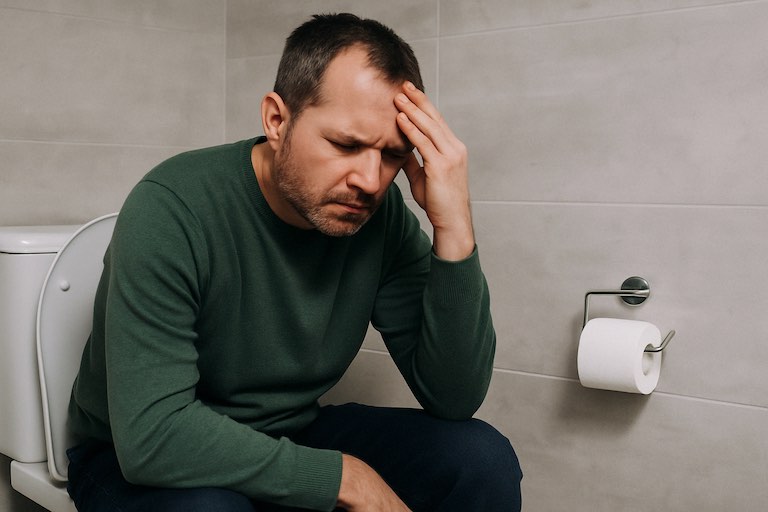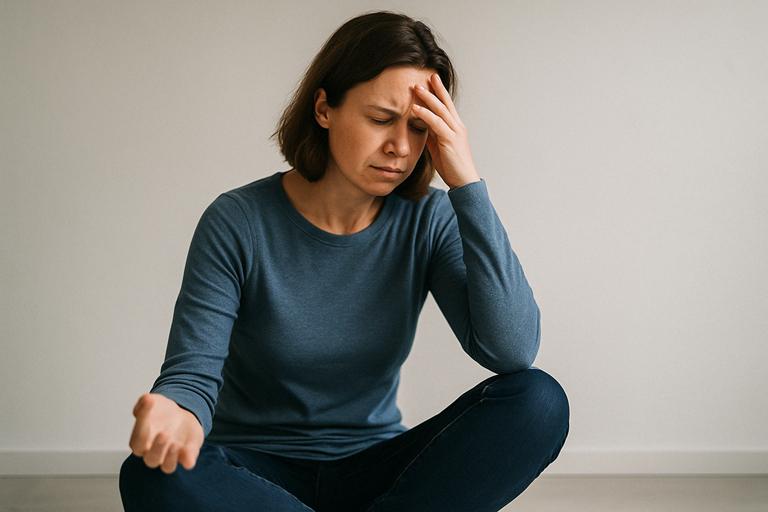On this page
- Toilet Anxiety Is Not An ‘Anxiety Poop’ – Let’s Get That Straight
- The Problem With Articles Like These
- What Toilet Anxiety Really Looks Like
- Dietary Triggers and the Role of Beliefs
- The Limits of Nutritional Solutions
- The Truth About Mindfulness
- What Actually Works
- We Need to Stop Minimising This Condition
Toilet Anxiety Is Not An ‘Anxiety Poop’ – Let’s Get That Straight
I’ve been working with clients that needed toilet anxiety help for over 25 years, and if there’s one thing that makes my blood boil, it’s reading content from so-called experts who clearly have never worked a day in their lives with this condition.
Take, for example, the Healthline article that claims: “Anxiety poop is a common response to high stress situations. The good news is it can be managed through mindfulness techniques and changes to your diet.”
This was in fact written by Alissa Palladino, a dietitian. Quite frankly, it reads as though she is trying to jump on the bandwagon of other people’s misery.

I’m sorry, Alissa, but this post of yours is so misguided I just had to speak out. I would love to hear from just one client you’ve worked with who has overcome toilet anxiety through mindfulness and dietary changes alone. I could probably offer hundreds who were sold that same advice and found no benefit from it whatsoever.
Here is the link https://www.healthline.com/health/mental-health/is-anxiety-making-you-poop-heres-how-to-soothe. I would strongly recommend you DON’T read it (but I know you will lol)
Let’s be honest, anyone who genuinely believes that mindfulness and a bowl of porridge will fix the crippling fear toilet anxiety creates has either lost the plot or simply has no clue what they’re talking about.
Toilet anxiety is not about feeling a bit nervous before a meeting and rushing to the loo or wondering “can anxiety cause diarrhea“. If you’re searching for genuine toilet anxiety help, you need far more than shallow advice or lifestyle tips. It’s not butterflies in the stomach before a presentation. It’s about having your life hijacked by the persistent fear that you might not get to a toilet in time, even when you never actually have an accident. It’s about constantly scanning for toilets, avoiding unfamiliar places, cutting down fluids, timing meals, and saying no to social events just to avoid the chance of needing the toilet unexpectedly.
And when you live like that, being told to “try mindfulness” feels like being handed a paper umbrella in a hurricane. These people need toilet anxiety help, not pointless platitudes!
If any of the terminology feels a bit much, the toilet anxiety glossary explains the key terms in plain English.
The Problem With Articles Like These
Articles like the one on Healthline reduce a serious, complex anxiety condition to nothing more than an upset stomach under pressure. They fail to acknowledge the obsessive thinking, the compulsive behaviours, and the subconscious loops that keep sufferers stuck.
They’re not talking about toilet anxiety. They’re talking about the normal gut-brain response that all humans have in stressful situations. And while that’s a real phenomenon, it’s not the same as what someone with toilet anxiety experiences on a daily basis.
When these articles pop up near the top of Google search results, people who are genuinely struggling come away thinking they’re either broken or beyond help. They try mindfulness. They search online for toilet anxiety help. They adjust their diet. They cut out gluten, dairy, sugar, caffeine, and joy. And when it doesn’t work, they blame themselves.
What Toilet Anxiety Really Looks Like
People with toilet anxiety often live by a strict set of unwritten rules. They might not realise it, but every decision they make is filtered through the question, “What if I need the toilet?” That question becomes the lens through which life is viewed.
Some of the rules they live by include:
- Never go anywhere without first checking where the toilets are
- Always go to the toilet before leaving the house, even if you don’t feel the need
- Limit fluid intake before outings to reduce the risk of needing to go
- Avoid certain types of travel, especially where toilets are not easily accessible
- Turn down social invitations unless the location feels ‘safe’
These are not strategies people want to use, they’re survival mechanisms that keep them functioning while feeling constantly on edge. People searching for toilet anxiety help often don’t realise that these behaviours are the very thing keeping the anxiety in place.
Dietary Triggers and the Role of Beliefs
It’s important to acknowledge that, for some people, certain foods really do trigger a genuine digestive response. Food intolerances can absolutely lead to an urgent need for the toilet, and in those cases, adjusting your diet makes perfect sense. If eating something at home consistently causes a strong reaction, then yes, avoiding that food is likely a good plan.
However, here’s the acid test, if you can eat that same food at home, in a calm environment, and have no reaction whatsoever, then chances are it’s not the food causing the issue. It’s the context, the anxiety, and the belief attached to it. In other words, the problem isn’t physiological, it’s psychological.
Many of the people I’ve worked with have developed strong beliefs about certain foods being dangerous or problematic, even when there’s no consistent evidence to support it. These beliefs can be powerful and convincing, but they’re not always accurate. When challenged gently and properly, many clients discover that their reactions are more about anxiety than biology.
This is why it’s so important to separate genuine food intolerances from learned associations and fear-based assumptions. Otherwise, people can end up with unnecessarily restrictive diets that do nothing to address the real root of their toilet anxiety. For those seeking toilet anxiety help, this distinction is critical, because working on the belief system rather than the food itself can be the key to real progress.
The Limits of Nutritional Solutions
Nutritionists play a valuable role in identifying genuine gut-related issues, and their input can be essential for people with medically diagnosed digestive conditions. When there is clear evidence that a food intolerance or dietary imbalance is contributing to symptoms, a skilled nutritionist can offer life-changing advice. Their work deserves credit.
However, even if they wave their magic wands and resolve all the physical gut symptoms, that does not resolve toilet anxiety. The truth is, the vast majority of people seeking toilet anxiety help have no clinical or biological evidence that there’s anything physically wrong. They can eat a wide range of foods at home without issue, yet still panic the moment they consider eating those same foods away from their comfort zone. That is not a gut issue, it’s a belief issue.
Beliefs, not biology, are often the hidden drivers behind persistent toilet anxiety. And beliefs cannot be meal-prepped away.
The Truth About Mindfulness

Mindfulness is often thrown around as a cure-all for anxiety, and while it can have some value in certain situations, it is vastly over-hyped when it comes to toilet anxiety. There is very little clinical evidence supporting its use for this specific issue.
The real problem is not just anxiety in the moment, it is the learned association in the subconscious mind that links leaving the house or being away from a toilet with fear and danger. That pattern will not shift just because someone tries to “observe their thoughts without judgement.”
In my experience, mindfulness for toilet anxiety is like trying to talk someone down from a panic attack by telling them to “just relax.” It sounds nice in theory, but it rarely works in practice.
What Actually Works
Toilet anxiety help comes from tackling the conditioned response, usually built over time, through repeated experiences of panic, embarrassment, or a general sense of being out of control. In some cases, it’s triggered by one bad experience. In others, it creeps in slowly through a mix of health anxiety, social anxiety, and hyper-awareness of bodily sensations.
What works is getting into the subconscious patterns that are driving the fear and changing them. This is where clinical hypnotherapy has proven incredibly effective for those seeking lasting toilet anxiety help.
Over the past 25 years, I’ve worked with thousands of clients from all over the world, both online and in person, and I’ve developed specific approaches to help them develop new, natural patterns of behaviour that register with the subconscious as the way forward:
- Identify the initial sensitising event that set up and created the anxiety
- Create new associations between safety and everyday activities
- Strengthen emotional resilience through subconscious reprogramming
- Build new routines that feel natural, not forced
- Interrupt the patterns that keep the anxiety going
- Rebuild confidence and trust in their body
- Break the habit of obsessive checking and planning
When this is done properly, clients often experience a major shift, not just in how they think about toilets, but in how they approach life more generally.
We Need to Stop Minimising This Condition
Toilet anxiety ruins lives!
I’ve worked with people who have missed weddings, holidays, birthdays, and even career opportunities because of this fear. I’ve worked with parents who avoid day trips with their children, people who take different routes to avoid traffic, and professionals who cannot get through meetings without quietly panicking. Many of these individuals had searched high and low for toilet anxiety help, but found only generic advice that never touched the root of the problem.
It is not a quirky problem. It is not “just stress.” And it is not something that will go away with a few deep breaths and a high-fibre diet.
It deserves proper recognition, proper treatment, and professionals who actually understand it, especially for those seeking real toilet anxiety help that works. Because that’s what this is, a condition that needs to be understood and addressed with real therapeutic insight. For anyone still searching for meaningful toilet anxiety help, it’s important to look beyond quick fixes and seek out strategies that deal with the problem at its core.
When people are offered shallow advice from those who don’t understand the full picture, it doesn’t just miss the mark, it risks making sufferers feel more isolated, more confused, and even more convinced that they’re beyond help. That has to stop. People deserve real answers and real strategies from someone who actually knows what they’re talking about.
